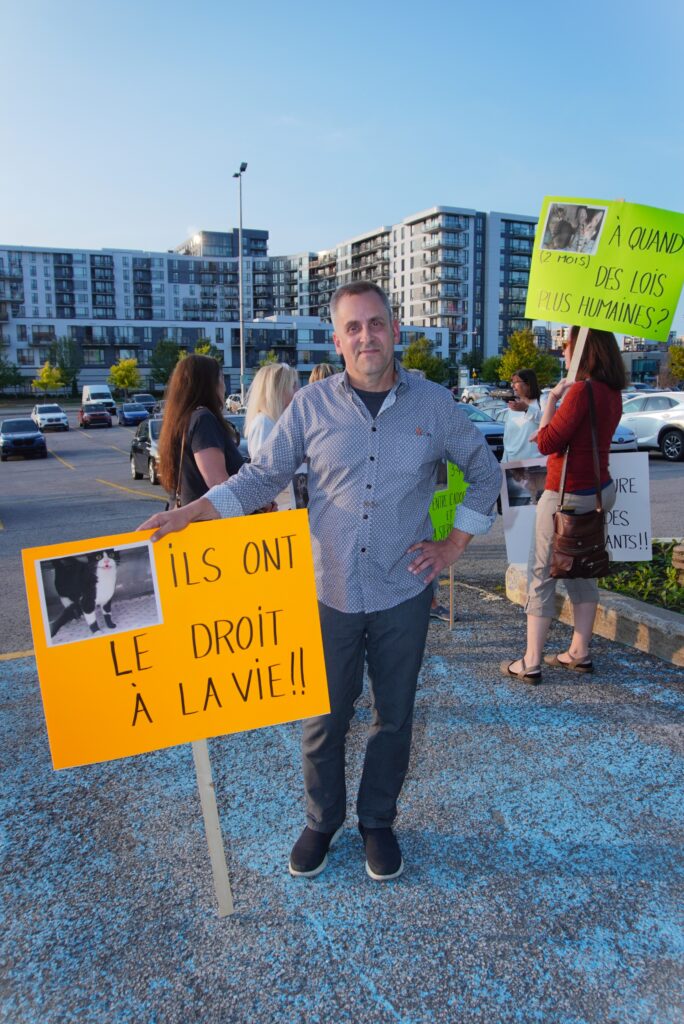By Matthew Daldalian — Local Journalism Initiative Reporter
At Laval’s most recent city council meeting, animal welfare concerns once again took centre stage. Protestors and residents demanded accountability over the city’s ongoing contract with Le Berger Blanc, the private shelter and animal control service that has faced criticism for years.
The push follows a June demonstration outside the facility where protestors raised red flags about adoption practices, euthanasia rates, and what they described as a lack of transparency. This time, citizens brought their concerns directly to councillors and Mayor Stéphane Boyer.
Access to information sparks outrage
Among those speaking was Sylvie Desrosiers, a Laval resident who used Quebec’s access to information law to request euthanasia statistics from the city earlier this year.
“I’ve been there on several occasions,” she said. “The animals, to visit them, you have to take them out in the parking lot. They clearly aren’t being taken outside otherwise. No volunteers, no enrichment. It raises real questions about the conditions they live in.”
Desrosiers said she was “shocked” when she reviewed the figures. Between 2023 and April 2025, a total of 1,906 animals were euthanized at the shelter, while 944 were adopted and 413 reclaimed by their owners. In 2024 alone, 960 dogs and cats— about 45 per cent of the animals housed there— were put down.
“The volume of animals that pass through Berger Blanc is immense,” she said. “It’s worrying.”
Calls for systemic reform
Patrick Devos, a retired hospital worker who now advocates for animal welfare, urged the city to consider a broader rethink of how animal services are run in Quebec.
Devos pointed to a 400-page “livre blanc” (white book) authored by former Mont-Saint-Hilaire official Denise Loiselle, which proposes creating a provincial Crown corporation to oversee animal services, replacing for-profit contracts with publicly run or nonprofit centres.

Patrick Devos, a retired hospital worker who now advocates for animal welfare, urged the city to consider a broader rethink of how animal services are run in Quebec. Photo taken September 9 2025 (Photo: Matthew Daldalian, Laval News)
“I think that in 2025, we should have the money to improve the living conditions of animals so that there will no longer be pounds, but rather animal centers that are ethical and have practices that promote animal welfare,” Devos said
The former hospital worker hopes Laval officials will agree to meet with Loiselle and hear her proposals.
“The city has adopted an ethical and animal welfare philosophy… we have to walk the talk,” Devos said.
Organizers keep pressure on
For Any Vézina, a protest organizer who also addressed council, the stakes are too high to ignore.
“We want answers on why there’s no transparency, why cages are so small, why so many animals are euthanized,” she said. “We want to know why, when the city does its four inspections a year, they don’t see what regular citizens see in a single visit.”

Any Vézina, a protest organizer who also addressed council, believes the stakes are too high to ignore. Photo taken September 9 2025. (Photo: Matthew Daldalian, Laval News)
Vézina warned that unless change comes soon, demonstrators will return each month. “It’s impossible that so many of us can witness irregularities, but the city sees nothing,” she said.
Political response
Parti Laval councillors Claude Larochelle (Fabreville) and Louise Lortie (Marc-Aurèle-Fortin) both expressed support for protestors during the council meeting. Lortie, who previously met with demonstrators outside the shelter, spoke about her personal experience hearing about Berger Blanc’s conditions.
Both pledged that, if elected in this fall’s municipal election, their party would introduce a CSRM program— capture, sterilization, return, and maintenance— focused mainly on stray cats. The model, already in place in other Quebec municipalities, reduces feral populations through vaccination and neutering rather than euthanasia.
Boyer defends city oversight
Mayor Stéphane Boyer acknowledged residents’ concerns but defended the city’s approach, stressing that Berger Blanc has changed since its widely publicized scandals of 2011.
He said the city receives regular reports and statistics, uses independent veterinarians, and investigates complaints.
Boyer did concede that Berger Blanc’s lack of a social media presence limits its reach. “In 2025, it’s probably a good idea to be on Facebook to get animals adopted,” he said, promising to consider adding such requirements in future contracts.
Debate not going away
For many, including Desrosiers, the city’s assurances do little to dispel doubts. “I myself called Berger Blanc a few times. Depending on who you talk to, you get different versions,” she said. “It doesn’t really advocate transparency.”
With Laval paying Berger Blanc $1 million annually to manage animal control, critics argue that taxpayers deserve greater transparency. The tension reflects a broader debate over whether animal services should be profit-driven at all— a concern echoed in June by Montreal SPCA director Sophie Gaillard, who said municipal or nonprofit models remain the gold standard.
As Vézina put it: “They are living beings. They deserve respect. And if necessary, we will come here every month until we have reached our goal.”



